-
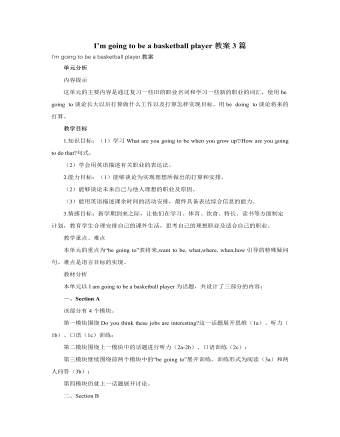
人教版新目标初中英语八年级上册I’m going to be a basketball player教案3篇
教学目标1.知识目标:(1)学习What are you going to be when you grow up?/How are you going to do that?句式。(2)学会用英语描述有关职业的表达法。2.能力目标:(1)能够谈论为实现理想所做出的打算和安排。(2)能够谈论未来自己与他人理想的职业及原因。(3)能用英语描述课余时间的活动安排,最终具备表达综合信息的能力。3.情感目标:新学期到来之际,让他们在学习、体育、饮食、特长、读书等方面制定计划,教育学生合理安排自己的课外生活,思考自己的理想职业及适合自己的职业。教学重点、难点本单元的重点为“be going to”表将来,want to be, what,where, when,how引导的特殊疑问句。难点是语言目标的实现。教材分析本单元以I am going to be a basketball player为话题,共设计了三部分的内容:一、Section A该部分有4个模块。第一模块围绕Do you think these jobs are interesting?这一话题展开思维(1a)、听力(1b)、口语(1c)训练;
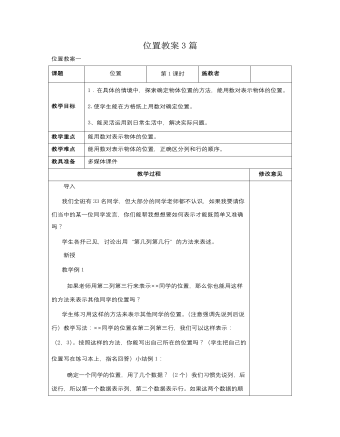
人教版新课标小学数学六年级上册位置教案3篇
【教学过程】一、从实际情景入手,引入新知,使学生学会在具体情景中用数对确定位置1.谈话引入。今天有这么多老师和我们一起上课,同学们欢迎吗?老师们都很想认识你们。咱们先来给他们介绍一下我们班的班长,可以吗?2.合作交流,在已有经验的基础上探究新知。(1)出示要求:以小组为单位,想一想,可以用什么方法表示出班长的位置,把你的方法写或画在纸上。汇报:班长的位置在第4组的第三个,他在从右边数第二组的第三排…哪个小组也用语言描述出了班长的位置?请班长起立,他们的描述准确吗?刚才同学们的描述有什么相同和不同?(都表示的是班长的位置,有的同学说第几组,第几行,第几排……)看来在日常生活中,我们可以用组、排、行、等多种方式,还可以从不同的方位来描述物体的位置。为了我们在确定位置的时候语言达成一致,一般规定:竖排叫列,横排叫行。
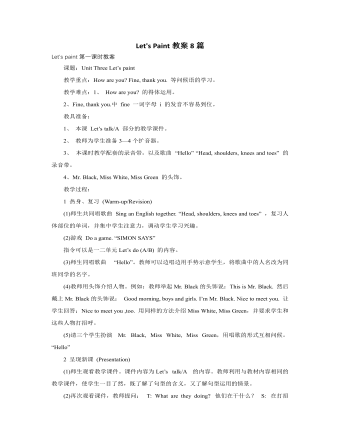
人教版新课标PEP小学英语三年级上册Let's Paint教案8篇
教学设计理念:英语课程标准明确指出,学生的发展是英语课程的出发点和归宿。小学英语课的主要目标是培养学生用英语做事情的能力,同时重视学科内容的有效融合。新课程提倡任务型教学,让学生在教师的指导下通过感知、体验、实践、参与和合作等方式完成教学目标。本着这一理念,我在设计本课时从激发和保持学生的学习兴趣入手,精心创设生活化语言情景,开展丰富多彩的活动,让学生在我的指导下进行语言交流,感受用英语交流的乐趣和成功感,从而培养学生用英语进行交流的能力。教学目标:1. 情感目标:关注学生的内在需要,在活动中培养学生的协作精神和竞争意识,培养学生学习英语的积极情感态度。2. 知识目标:能运用所学语言进行交流。3. 能力目标:通过本课的学习,学生能在实际生活中用英语进行问候;培养学生在课堂上进行自主评价的能力;培养学生根据情景猜测语义和在尝试中自我修正的学习策略。
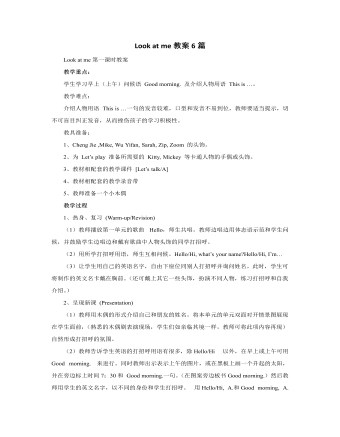
人教版新课标PEP小学英语三年级上册Look at me教案6篇
1.小组学习法全班分成各个部位,以半弧形状摆设,不仅拉近了师生、同学间的距离,便于口语交际和合作学习,而且让学生在独立与合作的交织中变得大胆、自信。2)Learning by singing, chanting, playing, touching.通过这些活动激发学生学习英语的兴趣,帮助他们建立学习的成就感和自信心。四.教学步骤英语课程的学习即是学生通过英语学习和实践活动逐步掌握语言知识,技能,提高实际运用能力的过程,又是他们陶冶情操,拓宽视野形成有效学习策略的过程。整个教学我设计了复习——新知展示——练习——小结及作业布置四个步骤。一.Warm-up1.Geetings2.SingasongT:Do you like to sing a song?Ss: Yes.T: Now, Let’s sing as ong,OK?Ss:OK. 【教师和学生一起边拍手边唱这首歌,不仅复习前面的打招呼语,而且把学生拉回到英语课堂,活跃了课堂的氛围,增加学生的学习兴趣】3.guessinggameT: Good. Look at me, What’s in my hand ?【教师拿出一个书包,书包内装入了各种学过的文具和一个玩具人头,让学生感到新奇,从而增强兴趣】
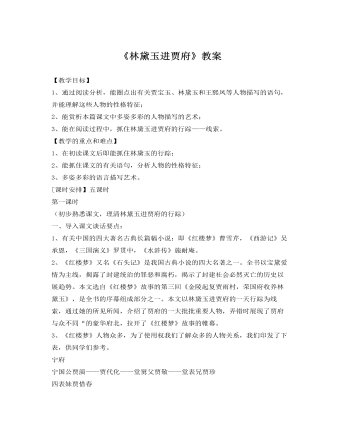
人教版高中语文《林黛玉进贾府》教案
第一课时(初步熟悉课文,理清林黛玉进贾府的行踪)一、导入课文谈话要点:1、有关中国的四大著名古典长篇幅小说:即《红楼梦》曹雪芹,《西游记》吴承恩,《三国演义》罗贯中,《水浒传》施耐庵。2、《红楼梦》又名《石头记》是我国古典小说的四大名著之一。全书以宝黛爱情为主线,揭露了封建统治的罪恶和腐朽,揭示了封建社会必然灭亡的历史以展趋势。本文选自《红楼梦》故事的第三回《金陵起复贾雨村,荣国府收养林黛玉》,是全书的序幕组成部分之一。本文以林黛玉进贾府的一天行踪为线索,通过她的所见所闻,介绍了贾府的一大批批重要人物,弄错时展现了贾府与众不同“的豪华府北,拉开了《红楼梦》故事的帷幕。3、《红楼梦》人物众多,为了使用权我们了解众多的人物关系,我们印发了下表,供同学们参考。
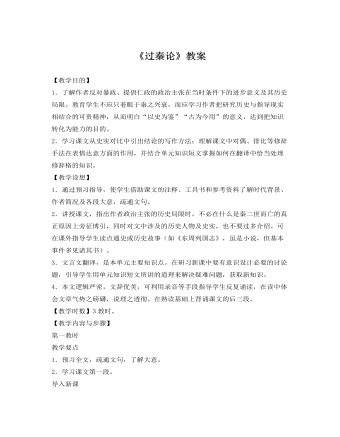
人教版高中语文《过秦论》教案
【教学目的】1.了解作者反对暴政、提倡仁政的政治主张在当时条件下的进步意义及其历史局限。教育学生不应只着眼于秦之兴衰,而应学习作者把研究历史与指导现实相结合的可贵精神,从而明白“以史为鉴”“古为今用”的意义,达到把知识转化为能力的目的。2.学习课文从史实对比中引出结论的写作方法;理解课文中对偶、排比等修辞手法在表情达意方面的作用,并结合单元知识短文掌握如何在翻译中恰当处理修辞格的知识。【教学设想】1.通过预习指导,使学生借助课文的注释、工具书和参考资料了解时代背景、作者简况及各段大意,疏通文句。2.讲授课文,指出作者政治主张的历史局限时,不必在什么是秦二世而亡的真正原因上旁征博引,同时对文中涉及的历史人物及史实,也不要过多介绍。可在课外指导学生读点通史或历史故事(如《东周列国志》,虽是小说,但基本事件多见诸其书)。
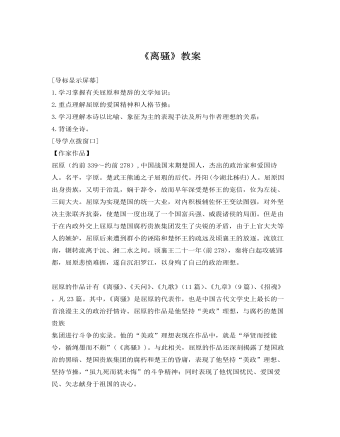
人教版高中语文《离骚》教案
2.亦余心之所善兮。虽九死其犹未悔评析:这一句表明屈原志向不改,坚贞不屈。真可说是一条铁骨铮铮的汉子。屈原最不能容忍的是那群无耻小人对他的恶毒诬蔑,一会说他穿着奇装异服,一会又说他面容姣好,肯定是个善淫之辈。这群人追名逐利,篡改法令,歪曲是非,混淆黑白,竞相谄媚,把朝廷弄得乌烟瘴气。屈原下决心绝对不和他们合流,他自比不合群的鸷鸟,孤傲、矫健,“自前世而固然”,他不想改变,也无法改变,这就像方圆不能周,异道不相安一样。在这里,屈原清楚地预感到了自己的结局,但他并不后悔自己的选择。句中“虽九死其犹未悔”和同出自于《离骚》的“路曼曼其修远兮,吾将上下而求索”诗句是后人引以自勉和共勉最多的句子。运用:(翻译)只要是我心中所向往喜欢的,即使死去九次也不会后悔。3.民生各有所乐兮,余独好修以为常。虽体解吾犹未变兮,岂余心之可惩。
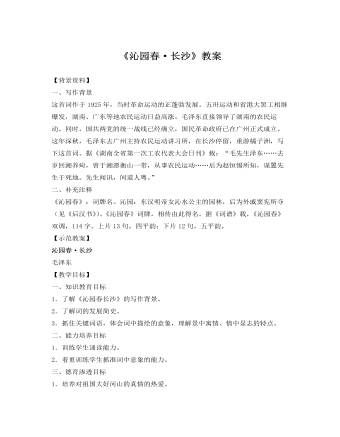
人教版高中语文《沁园春》教案
【重点、难点及解决办法】1.以乐景写哀,景中寓情,情中显志。从词中可以感受到词人的心情是惆怅的,写的又是寒秋景物,却毫无过去一般旧诗词里的那种肃杀、感伤的“悲秋”情调,词人笔下的秋景是活泼、美好的。原因在于越写山河的壮丽,就越使人感到人民不能主宰大地的可悲,越感到革命的必要。词人正是在这不一致中突出了强烈的革命精神。当然,这里面也含有热爱祖国壮丽河山的感情。2.对比手法的运用。词中含有多种对比,使描绘的形象鲜明,如“万山红遍”与“漫江碧透”主要是颜色的对比;“鹰击长空”与“鱼翔浅底”、“指点江山”与“激扬文字”主要是动作的对比;“同学少年”与“万户侯”是明比;“万类霜天竞自由”与人民的被压迫(未在词中点明)是暗含的对比。
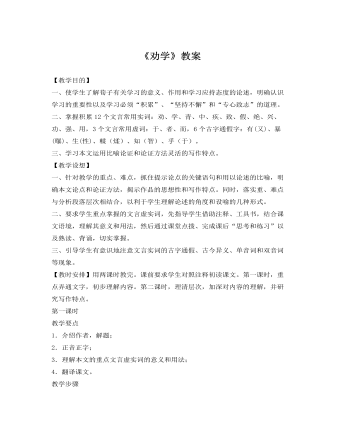
人教版高中语文《劝学》教案
(1)吾尝(曾经)终日而思矣,不如须臾(片刻)之所学也;吾尝肢(踮起脚跟)而望矣,不如登高之博见(看得广)也。(学、思对比,强调了学习的作用;跛望与登高对比,登高的收获大。两例证明利用学习、利用外物的作用。)(2)登高而招(招手),臂非加长也,而见者(看的人)远(远也看得见);顺风而呼(呼喊),声非加疾(快)也,而闻者(听的人)彰(听得更清楚)。(两例证明利用自然条件的作用。)(3)假(借助)舆马者(的人),非利足(快脚)也,而致(达到)千里;假舟楫者,非能水(善游)也,而绝(横渡)江河。(两例证明利用工具的作用。)(4)君子生(性)非异也,善假(利用)于(对)物(外物)也。连用比喻,得出结论:那些有才德的君子,生来本性与普通人没有什么两样(生非异也),只是由于他善于利用学得的知识和本领,善于利用处界条件弥补自身的不足,不断提高自己,所以才成为君子的。
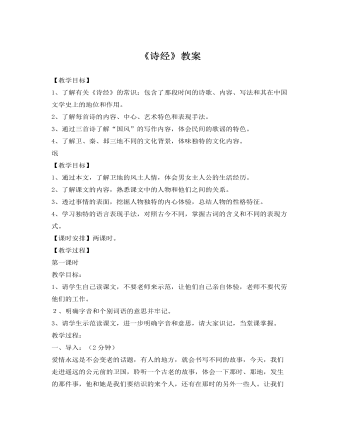
人教版高中语文《诗经》教案
《诗经》的重章叠唱及表现手法《诗经》善于运用重章叠唱来表达思想感情,即重复的几章间,意义和字面都只有少量改变,造成一唱三叹的效果。增强了诗歌的音乐性和节奏感,更充分的抒发了情怀。《诗经》里大量运用了赋、比、兴的表现手法,加强了作品的形象性,获得了良好的艺术效果。所谓“赋”是“敷陈其事而直言之”。这包括一般陈述和铺排陈述两种情况。“比”是“以彼物比此物”,也就是比喻之意。而“兴”则是《诗经》乃至中国诗歌中比较独特的手法。“兴”字的本义是“起”。《诗经》中的“兴”是“先言他物以引起所咏之辞”,也就是借助其他事物为所咏之内容作铺垫。它往往用于一首诗或一章诗的开头。大约最原始的“兴”,只是一种发端,同下文并无意义上的关系,表现出思绪无端地飘移联想。
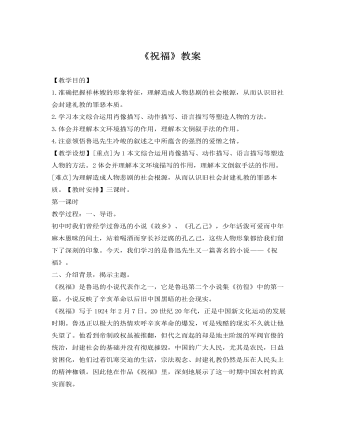
人教版高中语文《祝福》教案
C.人们的态度:“大家仍然叫她祥林嫂”,称呼依旧。这一淡淡的似乎不经意的过渡语,在具体语境中却隐含着深刻的蕴涵,反映出鲁四一家对祥林嫂的第二次婚姻冷酷而坚决地不予承认的态度。“仍然叫她祥林嫂”,而不是“贺六嫂”,绝不是习惯使然,而是反映了封建礼教观念对寡妇再嫁的完全否定。人们叫她的“声调和先前很不同”;“也还和她讲话,但笑容却冷冷的了”。整个鲁镇社会在伦理观念上与鲁四仿佛是形成了共识的,音调的变化,笑容的冷冷,反映出人物关系的变化,充分表现出社会环境与祥林嫂的严重对立。77人们很少同情和怜悯她,对她讲述的“阿毛的故事”很快就厌倦了,并把她作为取笑的对象。人们对祥林嫂的态度,使她感到痛苦与迷惑。她不时地向人们诉说着自己不幸的遭遇,她的精神却惨遭蹂躏。而柳妈的说鬼又给祥林嫂新的打击。D.柳妈说鬼:柳妈是一个怎样的人?祥林嫂为什么要化那么大的代价去捐门槛?捐门槛后祥林嫂有哪些变化?

人教版新目标初中英语七年级下册Where is the post office教案2篇
Period 2 (3a----Section B 2c)Preview(Pre-task): Key points: What laAdd another information about their pen pals----their language on the cardnguage does she/he speak?She/He speaks....Does she/he have any brothers and sisters? Does she/he speak English?Preview(Pre-task): Add another information about their pen pals----their language on the cardKey points: What language does she/he speak?She/He speaks....Does she/he have any brothers and sisters? Does she/he speak English?Step 1 Revision1.Revisionand dictation of the new words 2.Revise the drills they learned yesterday.(by pairwork and grammar exercise)Step 2 Leading-inT has a conversation with one student. The conversation is following:---Do you have a pen pal?---Yes, I do.---What's your pen pal's name? ---His/Her name is....---Where is your pen pal from? ---He/She is from...---Where does he/she live? ---He/She lives in....---What language does he/she speak?He/She speaks...Write the new words on the Bb. They are following: EnglishChineseJapaneseFrenchStep 3 LearnLearn the new words with the whole class.Finish 3a with the students3b Pairwork T still does an example with one student Then the Ss practise in pairs. The example is following:--Curry Muray is my pen pal. He is from the United States.---What language does he speak?

人教版新目标初中英语八年级下册It’s a nice day, isn’t it教案2篇
"Hello! Welcome to English class! Introduce yourself. Meet your new classmates." That's what the teacher says. What do you say? "Oh no!" It can be difficult talking to new people. But it can be fun, and you can make friends. How do you do it? Make small talk. Small talk is polite conversation. "Wang Nan is a great pingpang player, isn't she?" "I'd love to meet her, wouldn't you?" "It's been raining a lot, hasn't it?" Tag questions are a form of polite speech. To make small talk successfully, you should know how to make them. You should also know what topics to talk about. Try to learn this unit carefully. The next time you're in English class, you'll find out. Making small talk's easy, isn't it? (“你好!欢迎你!请做一下自我介绍。认识一下你的新同学。”通常在课上老师会这样说。你会说什么呢?“噢,不!”与陌生人谈话太困难了。但是这也很有意思,并且你还能交到朋友。你该怎么做呢?闲聊。闲聊指得是礼貌的对话。“王楠是一个很棒的乒乓球运动员,不是吗?”“我希望自己能认识她,你呢?“今年的雨水很多,不是吗?”反意疑问句是一种礼貌用语。为了使得谈话成功,你应该知道怎样去进行闲聊。你还应该知道与不同的人该谈论什么样的话题。认真的学习这个单元吧,下次在英语课上,你会发现与大家展开谈话是一件很容易的事情,不信我们来试试。)

人教版新目标初中英语九年级上册Teenagers should be allowed to choose their own clothes教案2篇
Step 1 Greeting Greet the class and check the homeworkStep 2 A duty report The S on duty gives a report on the rules in his home and lead in 3a “Sun Fei’s and Wu Yu’s rules” Step 3 ReadingSs read the conversation and write the two girls’ rules in the chart. Check the answers.Get Ss to read after the tape and then read aloud by themselves. Then, T explains the language points.Step 4 Pairwork 3bRole play. Use the information in chart to practice with the conversation in 3a covered. They can look at the sample conversation in the right box.Step 5 Task 2 “Who’s the best reporter?”Make a survey by asking any 5 students the questions in the chart in activity 4. Then give out a report about it. See who is the best reporter? And the best reporter will get a nice ball-pen.Step 6 Summary and homework:Write out the report in your exercise-books.Period ThreeStep 1 Greeting and a duty reportThe S gives a duty report talking about his experience of being late for school. Lead in the question “Do you ever get to school late? How often do you get to school late? Always, usually, sometimes, or never?Step 2 1a Get Ss to finish writing.Step 3 Pairwork 1b Get Ss to talk about their answers with their partners using the sample conversation in the box on the right.Step 4 Listening practice2a Lead-in: What will happen if you get to school late? What about Peter? Let’s listen to a conversation between Peter and his father. Get Ss to finish 2a (As usual, for the first time, Ss only listen.) Check the answers.

人教版新目标初中英语九年级下册We’re trying to save the manatees教案2篇
本单元主要围绕着有关濒临灭绝的动物这一话题,学习了应该怎样保护我们的环境,以及就某一问题展开辩论。目标提示语言目标能够运用所学知识,就某一问题展开辩论。认知目标1、复习一些语法:现在进行时、一般现在时、用used to 表示一般过去时、现在完成时、一般过去时的被动语态。2、学会表达同意和不同意。3、学会以下基本句型:We’re trying to save the manatees.Manatees eat about 100 pounds of food a day.There used to be a lot of manatees.In 1972,it was discovered that they were endangered.Some of the swamps have become polluted.情感目标了解一些濒临灭绝的动物的生活习性和濒临灭绝的原因,教育学生应该如何保护环境。教学提示充分利用多媒体等教学设备,创设与本课话题相关的情境,如各种不同种类的动物、动物园以及有关环境的画画等等。围绕着本单元的教学目标,设计一些贴近学生实际的教学任务,如让学生谈论自己最喜欢的动物,如何拯救濒危动物,如何保护环境等等。让学生根据所学知识,就动物园是否对动物有利以及其他的话题进行辩论。

人教版新目标初中英语七年级下册How was your weekend教案2篇
Teaching Goal:1. General aims:Talk about recent past events2. Particular aims:A. Language Focus.Talk about recent past events and think of the past events.B. Language goalsHow was….?It was …What did …do over the weekend?C. Language structures:(1). How was your weekend? I was great. Pay attention to no form.(2). What did you do over the weekend? I played soccer. We went to the beach.D. Useful words and phrases:Words: was, did, went, beach, over, project, test, wasn’t, false, number, geography, spend, week, most, mixture, their, had, little, cook, read, saw, change, everyone, sit, sat, no, anythingPhrases: did one’s homework, played soccer, cleaned my room, went to the beach, played tennis, went to the movies, on Saturday morning, over the weekend, cook … for, what about, do some reading, have a party, talk show, go shoppingE. Grammar language:Present simple past tenseRegular and irregular verbsF. Learning strategies:Tour and holidaysG. Interdiscipinary:H. Emotion and manner:Teaching time: 5 periodsTeaching procedures:Period One教学步骤、时间 教师活动 学生活动 媒体应用Step 1Free talk 3’ Ask some questions like:Who’s on duty today?What’s the weather like? Answer and talk about something.让同学们回答下列问题1. Do you like weekend? (Let some students answer)It takes them three minutes to talk about the question.2. Why do you like weekend? (let the students answer) Most of the students like the weekend此时教师用汉语问:“在周末期间问你干了什么?这句话用英语这么回答?Let the students guess.At last the teacher give them right answer3. What did you do over the weekend?(板书、学习)
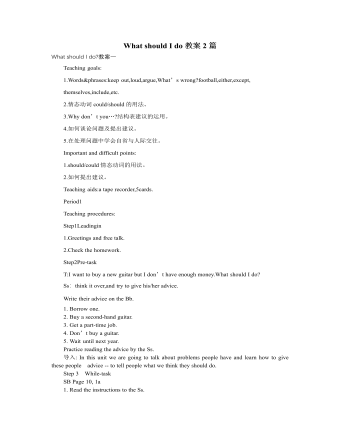
人教版新目标初中英语八年级下册What should I do教案2篇
说明:在帮Li Lei提建议的同时,教育学生如何学好英语。第三课时教学目标1. 语言目标:a) 词汇: Original, in style, haircut, the same as.b) 语言结构:My friend wears the same clothes and has the same haircut as I do.2. 能力目标:大多数学生能够谈论自己喜欢哪种服装,提高查找信息的能力。3. 情感目标:学会如何与朋友相处,要有自己对时尚的看法。教学重点掌握一些重要词汇。教学难点学会谈论问题,并能提出书面建议。◆教学突破首先针对Erin的问题,提出个人的建议,模仿2c部分的对话展开双人交际Pair-work;听老师诵读3a部分的信件,并找出LEFT OUT的问题所在;学生完成3b部分的内容,给Left Out提出书面的建议;学以口头形式提出自己目前存在的某个问题,讲给大家听,让同学们给自己提出一个建议,并作笔录;学生两、三个人分成一组,随意性地进行口语交际,谈论P14的第4部分的某个问题,相互交换意见。
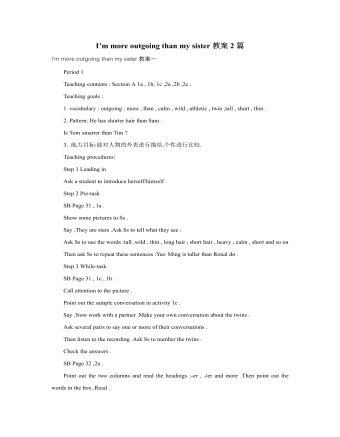
人教版新目标初中英语八年级上册I’m more outgoing than my sister教案2篇
1 交通工具的比较此活动为小组活动。学生通过讨论找出到达某一城市可乘坐的各种交通工具,并选择最佳出行方式。Teacher:We’re going to Shanghai. How many ways can we use to get there? Yes, there are four ways: by bus, by plane, by train, by ship. Please discuss how you are going to get there.操作建议:(1)学生以小组为单位展开活动,谈论本组所选择的交通工具。(2)各组选代表向全班汇报,阐述本组所选择的交通工具的利和弊。完成任务所需要的语言结构:We can go there by ship. It’s more comfortable and cheaper than any other transportation.We can go there by bus. It’s cheaper but it takes longer time.2 哪个城市更合适?此活动具有挑战性。假设中国要举行2014年世界杯足球赛,分别从历史,人文,天气等方面对各城市(北京,大连,上海,昆明)进行比较,选择最佳举办城市。T: Imagine China is holding the 2014 FIFA World Cup. Which city do you think is the best for the World Cup, Beijing, Dalian, Shanghai or Kunming? Let’s work in groups. If you choose Beijing, please join the Team Red. If you chose Dalian, please join the Team White. If you choose Shanghai, please join the Team Blue. If you choose Kunming, please join the Team Green. Please show us its advantages. Then let’s see which team will win.

人教版新目标初中英语八年级下册He said I was hard-working教案2篇
This activity introduces some new vocabulary and provide oral practice using the target language.Task 1 . Ask four students to stand in front of the class, and the teacher asks them the following questions as a reporter.1.What are you going to do when you grow up?2.What are you going to do next week?3.What are going to do after school?The students will give different answers, then ask a good student to report what they said.I am going to e a doctor.What did she say?----------She said she was going to be a doctor.I am going to have a party on Friday night.What did he say?-------He said he was going to have a party on Friday night.I am going to do my homework.What did she say ?------ She said she was going to do her homework.I am going home after school.What did she say?-----She said she was going home after school.Say In this unit we are going to learn to use words like to report what someone said.Task 2. Read the instructions. Then ask a student to read the four questions. And write the words on the Bb. Explain what soap opera is.Task 3. Ask the students to Look at the pictures, point out the TV screens in the picture. Ask one girl to read what Marcia said.What did Marcia say? She said She said she was having a surprise party for Lana on Friday night. Repeat the other pictures in the same way.Activity3. Listen and number the pictures in activity 1a.

人教版新目标初中英语九年级上册Where would you like to visit教案2篇
The First PeriodⅠ.Teaching Aims and DemandsKnowledge Objects(1) Key Vocabularytiring, educational, fascinating, thrilling, peaceful, exotic, trek, jungle, take it easy, explore, historic, site(2) Target LanguageWhere would you like to go on vacation?I’d like to trek through the jungle, because I like exciting vacations.2. Ability Objects(1)Train students to talk about places they would like to visit with the target language.(2)Train students to describe vacations with different adjectives.(3)Train students' listening skill.3. Moral Object,It′s more interesting to go on vacating somewhere instead of staying at home.Ⅱ. Teaching Key Points1. Key Vocabularytiring, educational, fascinating, thrilling, peaceful, exotic, trek, jungle, take it easy, explore, historic, site2. Target LanguageTalk about different places with the target language.Ⅲ. Teaching Difficult Points1. Describe vacations with different adjectives.2. Talk about different places with the target language.Ⅳ. Teaching Methods1. Teaching by illumination2. Teaching by doing chain drills3. Teaching by pairworkⅤ. Teaching Aids1. A tape recorder2. Some pictures of different places with famous views

